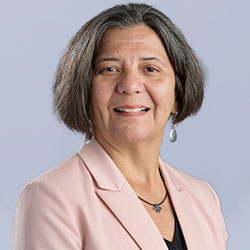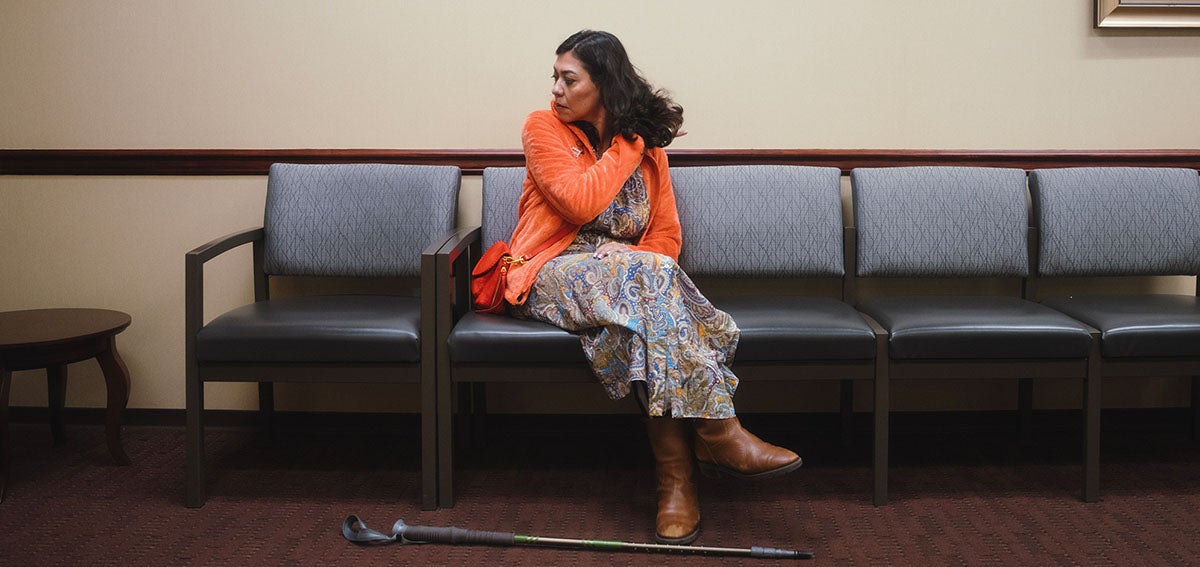View the Report
Jump to All Downloads & LinksRead the full version of this letter (PDF), including extensive endnotes with links.
Submitted on November 27, 2018 via www.regulations.gov
US Citizenship and Immigration Services
Department of Homeland Security
20 Massachusetts Avenue NW
Washington, DC 20529-2140
RE: Comments on Proposed Regulation — Inadmissibility on Public Charge Grounds (DHS Docket No. USCIS-2010-0012)
Dear Sir or Madam:
I am writing on behalf of the California Health Care Foundation to express our strong opposition to the Department of Homeland Security’s Notice of Proposed Rulemaking (“proposed rule”) on “public charge,” published in the Federal Register on October 10, 2018.
About the California Health Care Foundation
The California Health Care Foundation is an independent, nonpartisan philanthropy that works to improve California’s health care system for all Californians. Because Californians with low incomes experience the biggest health burden and face the greatest barriers to care, our priority is to make sure they can get the care they need. We are especially focused on strengthening our state’s Medicaid program (known as Medi-Cal) — the cornerstone of California’s safety net. We are also committed to finding better ways to meet the health care needs of the millions of people who remain uninsured in our state.
As an organization with deep knowledge of Medi-Cal, regular communication with safety-net health care providers, and a strong commitment to evidence-based policymaking, we hope we can provide useful insight into the likely impacts of the proposed rule change on Californians’ health and access to health care, as well as point to the ripple effects these impacts would have throughout our state’s communities and economy.
The Proposed Rule Change
There are many reasons to oppose the proposed rule, which is a radical departure from current policy and redefines “public charge” in unprecedented ways. The current public charge test considers whether an applicant is likely to become primarily dependent on the government for subsistence. This is defined as likely to become primarily reliant on government cash assistance programs for subsistence income or long-term institutionalized care. In determining this, only use of SSI, TANF, and General Assistance programs is considered, as well as whether applicants (1) have a sponsor’s affidavit of support, and (2) have other circumstances indicating that they are no longer likely to continue primary reliance on such governmental cash assistance for subsistence in the future (“totality of circumstances”).
The proposed regulation redefines public charge to be an immigrant “who receives one or more public benefits.” The proposed rule also fundamentally alters the totality of circumstances test and its purpose. Under the proposed rule, the test would now include a long list of negative factors that would be applied to every applicant for permanent resident status. The factors would make it much more difficult, especially for low- and moderate-income applicants, to avoid being determined a public charge and therefore denied entry or change of status. Use of any of a greatly expanded list of safety-net programs would be a heavily weighed negative factor. In addition to the current consideration of SSI, TANF, General Assistance, and long-term institutional care at government expense, use of nonemergency Medicaid, Medicare Part D subsidies for consumers with low incomes, Supplemental Nutrition Assistance Program (SNAP), and low-income housing supports (Section 8) would all now penalize immigrants seeking to adjust their status. In addition, an applicant would be penalized for being too young (under 18) or too old (62 or older), having a lower household income, speaking limited English, or having a preexisting medical condition unless they can demonstrate private health insurance or financial resources to pay for all “reasonably anticipated medical costs” — a bar likely out of reach for most of us.
If finalized, the proposed rule is expected to jeopardize the ability of hundreds of thousands of people now residing in the US from gaining permanent residency status, or from entering the US to reunite with their families here. This would have drastic human, economic, and societal impacts.
In California, the state with the largest percentage of legal permanent residents, where roughly 27% of our residents are foreign born and half of our children have at least one immigrant parent, the impact would be profound. Of special concern to the California Health Care Foundation, the rule is also expected to curtail the use of necessary health care, nutrition, and other safety-net services by immigrant families currently eligible for these services. The Department of Homeland Security acknowledges in the proposed rule text that noncitizens currently eligible for safety-net programs might disenroll, although with a significant under-estimate of that impact. History and previous analyses suggest there will be a widespread “chilling effect” on enrollment, reaching far beyond those immigrants to whom the newly defined test would apply. In addition to reports from other states, we have already heard directly from California health care providers, community-based organizations, Mexican consulate staff, and others that the proposed rule change is creating fear and confusion, leading immigrants currently eligible for services to consider disenrolling in health care coverage and to forego needed care out of understandable fear and confusion over the proposed rule.
Impact on Californians’ Health and Health Care
Since our founding, the California Health Care Foundation has worked to expand access to health care to Californians with low incomes. Research tells us that comprehensive coverage and access to health care is the critical first step toward improved health for the individual and our society. The Institute of Medicine and a robust and longstanding body of evidence makes it clear that lack of insurance is associated with poorer health and earlier death. Those with insurance are more likely to get preventive care and needed medicines, and are less likely to suffer undiagnosed chronic conditions or to receive substandard medical care. Those with comprehensive health coverage are also less likely to suffer financial hardship or bankruptcy due to medical bills.
Since 2013, California has succeeded in reducing the state’s uninsured rate from 17% to a historic low of just over 7% by 2016. Uninsured rates have declined among every racial and ethnic group. Our expansion of full-scope Medi-Cal (California’s Medicaid program) under the Affordable Care Act has been the primary driver of this success. Thanks to Medi-Cal, millions of Californians have access to primary and preventive care, oral health care, hospitalization, prescription drugs, behavioral health care, long-term care, and other vital services. It provides needed care to our state’s children, mothers-to-be, seniors, people with disabilities, and veterans. It is a vital source of health coverage for millions of low-wage workers struggling to make ends meet. (Two in three adults age 18–64 who are enrolled in Medi-Cal work.) It is also a lifeline for the one in three Californians with mental illness who get their coverage through Medi-Cal.
We know Medicaid coverage has positive impacts on health, improves access to prescriptions, reduces financial hardship, and reduces preventable mortality — making the impact of loss of coverage starkly clear. Compared to uninsured Californians, our residents with Medi-Cal are 40% more likely to receive a routine checkup. They are also more likely to have a usual source of care that is a community clinic or doctor’s office.
By 2015, roughly 96% of California’s children had health care coverage. Believing that every child is important and that we are all better off when every member of our community has accessible, comprehensive health care, California used state funding to expand comprehensive Medi-Cal coverage to all children in low-income households, regardless of immigration status. Through Medi-Cal, families can ensure their children get regular checkups, important developmental screenings, needed medicines and vaccines, oral and vision care, mental health services, and chronic condition treatment and management. Children on Medi-Cal are twice as likely to receive routine and preventive medical and dental care, and less likely to miss school because they are sick or injured, compared to their uninsured classmates.
Impacts on Californians’ Health
The proposed rule threatens the tremendous progress our state has made. It scares currently eligible immigrants into disenrolling from or avoiding enrollment in Medi-Cal, regardless of whether the rule would apply directly to them. While the vast majority of enrollees in California’s public programs are US-born citizens, the Migration Policy Institute has estimated that there are over 2.8 million Californians who are not yet US citizens and who are members of families who use Medicaid and the Children’s Health Insurance Program (CHIP), and over 992,000 Californians who are not US citizens are members of families who use SNAP to access affordable food for their families.
The impact of the proposed rule would likely be devastating in our state. Researchers from UCLA and UC Berkeley project that between 317,000 and 741,000 Californians would disenroll from Medi-Cal and between 129,000 to 301,000 from SNAP. It is worth noting that the UC estimates are based on conservative assumptions and so should be considered low-end estimates (see endnote in full letter for more detail).
As described in their recent article, Leah Zallman, MD, MPH, and Karen Finnegan, PhD, of the Institute for Community Health identify a particularly vulnerable segment of the population at risk for disenrollment: children with an identified need for medical services. Using an established methodology and the most recent available Medical Expenditure Panel Survey data, they identify 1.3 million California children in need of medical attention who lived in households with at least one noncitizen adult and were insured by Medi-Cal. They define “children in need of medical attention” as children with a current or recent medical diagnosis, disability, or need for specific care. Applying disenrollment rates of 15% to 35%, they find 195,000 to 455,000 California children in need of medical attention might disenroll from Medi-Cal and are then likely to become uninsured. Among others, this includes:
- 40,000 to 93,000 children with at least one potentially life-threatening condition, including asthma, influenza, diabetes, epilepsy, or cancer
- 27,000 to 64,000 children using prescribed medications
- 24,000 to 56,000 newborns
- 17,000 to 39,000 children with musculoskeletal and rheumatologic conditions like fractures and joint disorders
The Department of Homeland Security itself acknowledges that the proposed rule could lead to “worse health outcomes, including prevalence of obesity and malnutrition, especially for pregnant and breastfeeding women, infants, and children” and “increased prevalence of communicable diseases, including among members of the US citizen population who are not vaccinated,” “increased use of emergency rooms and emergent care as a method of primary health care due to delayed treatment” and “reduced prescription adherence.” And as Health and Human Services Secretary Alex Azar recently noted, security — when it comes to necessities such as nutrition — plays a critical role in people’s health: “How can someone manage diabetes if they are constantly worrying about how they’re going to afford their meals each week?”
What is not described in the proposed rule and what bears mention are the likely impacts on immigrants’ emotional well-being and mental health. There is strong evidence that the immigration environment prior to the release of the proposed rule had already created high levels of fear, stress, and uncertainty among immigrant families. Families and pediatricians have described changes in children’s behavior, such as problems sleeping and eating; psychosomatic symptoms, such as headaches and stomachaches; and mental health issues, such as depression and anxiety. Parents and pediatricians also reported that fears are negatively affecting children’s behavior and performance in school. Pediatricians uniformly expressed significant concerns about the long-term health consequences of the current environment for children. The proposed rule will certainly increase the fear and uncertainty for immigrant families. The direct impact of losing health care, nutrition, and other basic services will be compounded by the lasting impacts of this stress on mental health.
Impacts on California’s Health Care System
In addition to improving the health of Californians, having more Californians covered helps us continuously improve our safety-net health system in ways that benefit everyone. As the DHS itself acknowledges, the proposed rule could lead to “increases in uncompensated care in which a treatment or service is not paid for by an insurer or patient.” California has succeeded in reducing our uncompensated care costs to a record low. That means more resources for safety-net clinics and hospitals to make investments that improve value and maintain adequate services for all patients. Decreasing Medi-Cal enrollment and increasing the number of people who are uninsured — the likely scenario under the proposed rule changes — would threaten this progress.
Impacts on California Economy and Communities
We know the valuable contributions — cultural, social, intellectual, economic — that immigrants make to California. We see it every day. California immigrants contribute billions in taxes, pay more in private health insurance premiums than they use in health services, work at some of the most demanding jobs for meager pay, and create small businesses that are critical to our economy. We can expect that lower immigration will have a direct, negative impact on the broader California economy.
Researchers from UC Berkeley and UCLA modeled the ripple effect of the loss of federal Medi-Cal and SNAP funding on jobs and the California economy. They estimate job losses of up to 17,700 (assuming a 35% disenrollment rate), with close to half of those jobs in health care, further damaging our health care system, and with job losses higher in areas where disenrollment would be greatest, including Los Angeles and surrounding Southern California as well as the San Joaquin Valley.
Reducing Medi-Cal and SNAP enrollment will also likely have additional economic impacts throughout California. UC Berkeley and UCLA researchers project $1.2 to $2.8 billion in lost economic output and $65 to $151 million in lost state and local tax revenue, if the proposed public charge rule is finalized.
The rule would also impose what California Attorney General Xavier Becerra describes as “substantial direct and indirect costs on the state,” including “substantial administrative costs upon California.” California and its state and local agencies would have to devote significant time and resources to revising guidelines and consumer information in multiple languages for an undetermined number of public benefit programs. Consumer-facing agencies would also have to devote significant time and resources responding to a flood of inquiries from concerned residents.
In Conclusion
The proposed public charge rule would do serious harm to the health of the people, health care system, and economy of California. For those reasons, the rule should be rejected. But beyond this, federal policy in America should reflect our national values. It should respect human dignity, protect families and children, and recognize the contributions that all members of society make, including those who are immigrants.
The proposed rule would do the opposite. It would sow fear and confusion, punish parents who try to care for their children, and prevent hardworking immigrant families from contributing fully to society.
America is a nation of immigrants. This new public charge rule cannot change that. What it would change is whether we are a healthy nation, and a decent one.
Sincerely,
Sandra R. Hernández, MD
President & Chief Executive Officer
California Health Care Foundation
The full version of this letter, including extensive endnotes with links, is available for download below.
Authors & Contributors





